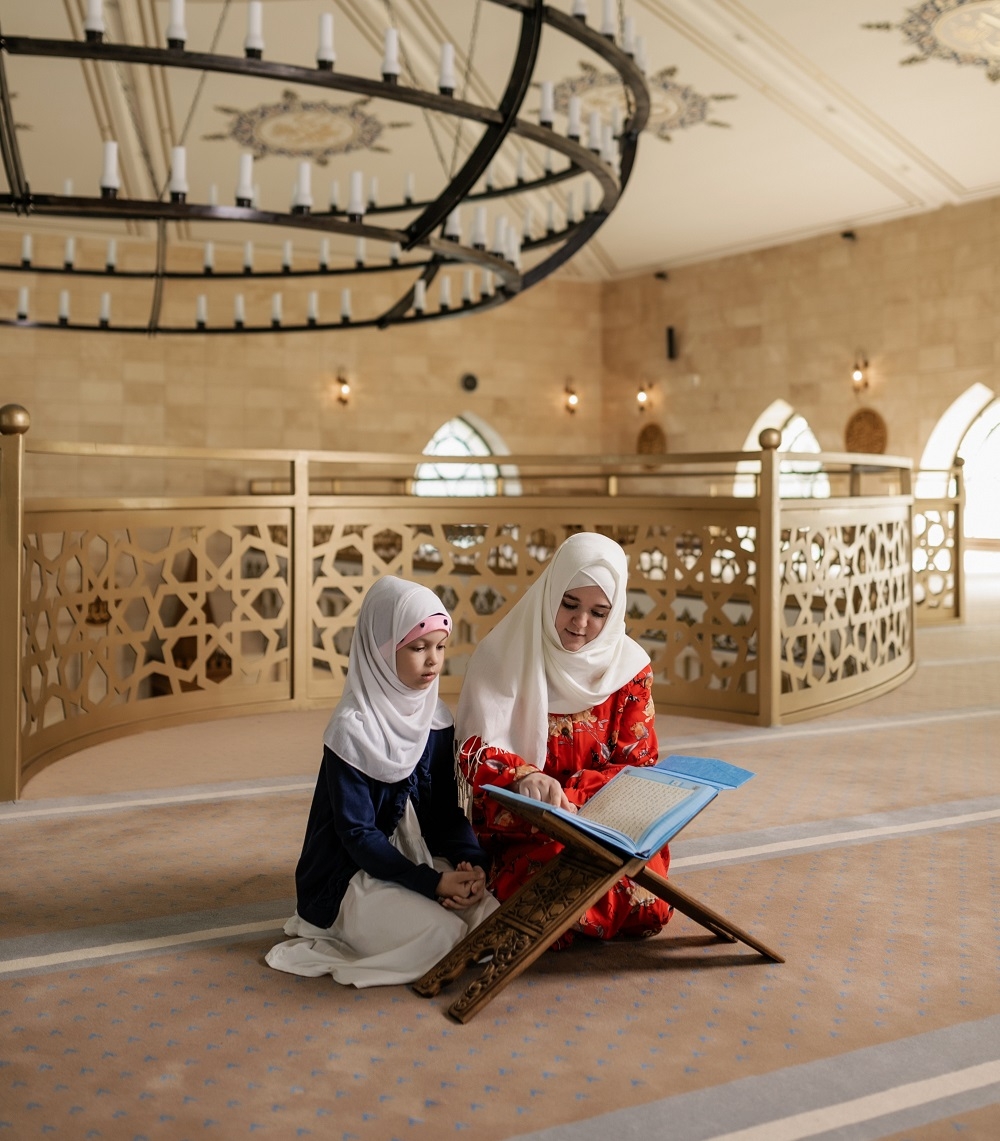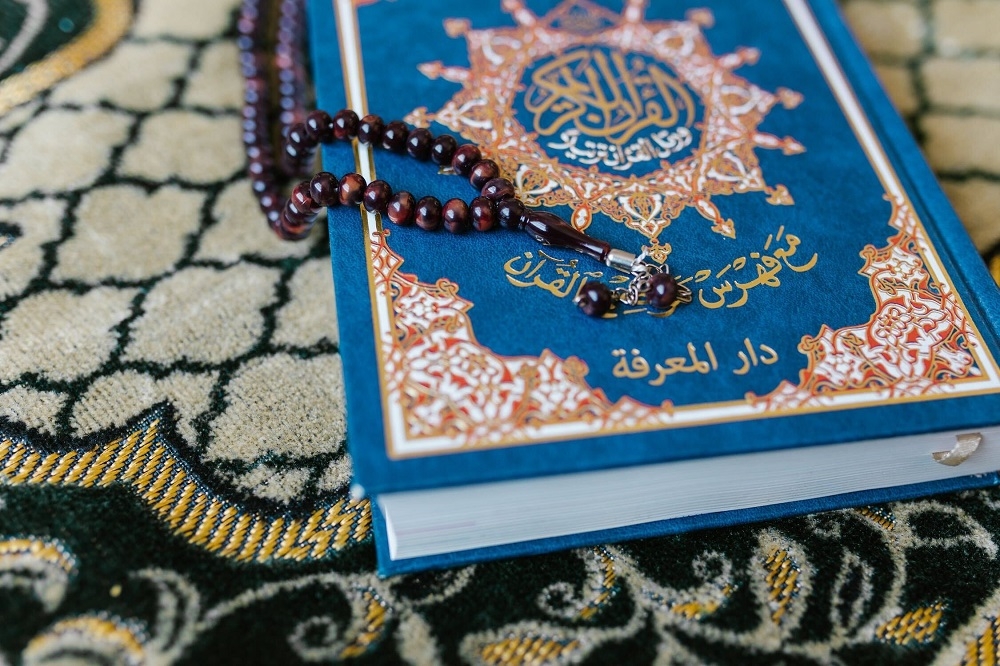6 Programs to Help You Learn How to Read (or Memorize and/or Understand) the Quran
Faith
|
Sep 19, 2022
|
7 MIN READ

Image source: Pexels
I rubbed my quivering stomach, straining to control my breath as I read the long Quranic verse on the screen. I mercifully reach a stop and pause to refill my emptied lungs. As I continued to recite, I waited for my Quran teacher to stop and correct me. Each time I reached a pause without interruption, my stomach quivered a little more from a sense of accomplishment.
Then it happened. My teacher mentioned that I hadn’t elongated a vowel properly, saying in her beautiful West African accent, “Let’s go back.” She rarely misses a mistake.
I went over the words again, repeating them until I recited everything to her satisfaction. Mercifully, I had improved over the year and a half since she graciously began teaching a small group of Muslim women over WhatsApp. So, there was less need for her to stop me and make me go back. After years of being Muslim, my long spiritual journey to learn how to read the Quran in Arabic and strengthen my connection with Allah's (s) holy words was coming to fruition.
I took my shahada (testament of Muslim faith) and entered Islam more than 33 years ago. Like many new Muslims in the United States, my first experience reading the Quran was in English. Although I had seen the noble book in my father’s possession (he was the first to convert in his family), I wouldn’t receive my own until after I entered the faith. My first Quran is long gone, but I remember finding so much peace in reading it in English. As I read, I would look over at the Arabic text next to the English, wanting desperately to understand the original language of revelation.
Like many Muslims, a desire to connect more intimately and to get more blessings from reading the Quran in Arabic fed my commitment to learn the language and the proper way to recite Allah’s (S) words. It took many years, but I learned valuable lessons about this form of worship during the journey to understand as much of the Quran as possible and recite it to the best of my ability.

Image source: Pexels
One of the most beautiful things about the Quran is the powerful ways it touches the heart of believers, providing them with certainty in its guidance. Allah (S) says:
This is the book. There is no doubt about it. A guidance for those who fear Allah (S).
[Surah Baqarah 2:2]
In addition to guidance, the Quran is a source of blessings through the learning and reciting of it. There are numerous hadiths about the merits of reading Quran, affording those who do the opportunities to earn rewards down to reciting each letter. The Prophet (saw) said:
[Whoever recites a letter] from Allah's Book, then he receives the reward from it, and the reward of ten the like of it. I do not say that Alif Lam Mim is a letter, but Alif is a letter, Lam is a letter and Mim is a letter.
[Jami` at-Tirmidhi 2910]
The combination of guidance and blessings makes the Quran more than a book. It lights a path for us to develop ourselves and strengthen our relationship with the creator. The more deeply we incorporate reciting and reading (for meaning) the Quran in our lives, the more integral it becomes to our worship and individual development.
Ideally we should want to keep the Quran as a regular part of our daily devotion, preferably in the original Arabic in addition to translations in our native tongue. Most of us are non-Arabic speakers, and there is a process to acquire the skills necessary to recite and read Quran. Even many native Arab speakers need to learn how to recite Quran (as the Arabic of the Quran is not exactly the same as the Arabic that native speakers learn) and explore its meaning correctly.
At first, I was shy about wanting to learn the Quran because I was new to the faith, but I discovered that studying Quran is a level learning playing field. It doesn’t matter if someone is a new Muslim because they will study with born Muslims and those who have been Muslims for years and even decades. They will learn to recite Allah’s (S) word with people of all ages and backgrounds.

Image source: Pexels
During my journey of learning to read Quran, I observed the layers of skills required for Quran recitation, including acquiring proficiency in reading Arabic and the rules of recitation – known as tajweed. While I learned to recite, I explored meaning through tafsir (explanation) and memorized (hifz) enough short chapters so that I knew enough to make salah (prayer), expanding my memorization with the more I understood.
Each layer of studying Quran (Arabic, tajweed, tafsir and hifz) requires finding the educational opportunities necessary to grow in proficiency. Fortunately, many local mosques may offer basic Arabic and Quran classes. If you’re just starting out learning or want to get back into learning the Quran, find out what your local Muslim community offers. Because there are so many blessings in teaching Quran, there may be a sister in your area available. If there is nothing local, don’t give up hope. Hit the Internet! Your next Arabic or Quran class may be just a Google search away.
If you find an exciting class, ask a family member or friend if they’ve taken it. They may recommend just what you need.
Below are some online courses I’ve either taken or that someone recommended as beneficial. There are many more out there. Don’t be shy – the opportunity to learn is there for the taking!
Quran Arabic and Tajweed
Learning Arabic is the gateway to reading the Quran in the original language of revelation. You might have listened to the Quran in Arabic and noted a difference in how it moves you despite not understanding it. Arabic Quranic recitation can be powerful to hear and recite yourself, which is why so many Muslims work hard to learn how to recite, even if they may never become fluent in understanding Arabic.

Image source: Pexels
There are lots of “Arabic Made Easy” online courses where you can learn how to read Arabic well enough to start reciting Quran. The online schools below have courses from basic Arabic to advanced classes in tajweed.
1. Ribaat Academic Institute (RAI) (registration and fee required) – This women-centered educational organization has levels of Arabic courses, starting with basic Arabic Novice Beginners (Section 1). According to RAI, this course, “is the first course in the Ribaat Arabic Language Program. It is designed to equip learners with the skills to read (phonetically decode) and write the Arabic script with vowels and provide them with a range of high-frequency vocabulary which they can use in their reading of Quranic texts and to offer greetings in Arabic.”
Click here for more course information.
2. Islamic Online University (IOU) Arabic Reading and Writing Made Easy (login required & subscription) – According to IOU, this Arabic course, “is aimed at teaching the basics of Arabic reading and writing to students with little or no background in Arabic. The course is uniquely structured so that the student does not need to memorize all 28 Arabic alphabets and 112 vowel variations before learning to read and write. The course focuses on teaching proper articulation of all Arabic letters and vowels. In each module, students will be given adequate time and training to read and write practice words in addition to examples from the Quran.
The course is part of their diploma program. Click here for more information.
3. Quran Revolution (QR) (registration and fee required) – Quran Revolution is a program with a new teaching method that asserts students will “learn six years worth of tajweed in three months. Our unique curriculum was designed from scratch for native English speakers. You’ve never heard the Quran taught like this.” Click here for more information.
Memorization and Tafsir

Image source: Pexels
Memorization remains integral to a Muslim’s ibadah (worship). Not knowing some Quran by heart makes praying difficult. When we stand for prayer, we must include some Quran recitation. Surah (chapter) Al-Fatihah is often taught to new and growing Muslims to ensure they know it well enough to recite it in every prayer along with short surahs like Ikhlas, Falaq and Nas.
Once a Muslim memorized enough Quran to pray, they may choose to expand their memorization to other chapters or even commit to becoming hafiz – someone who memorizes the entire Quran. Whether you want to know enough for prayers, memorize all of Allah’s (S) word or try to memorize some surahs that resonate with you, having access to instructors who will help you organize the process is vital.
While exploring Quran memorization, students often understand the text better, including background stories of revelation (when and why a chapter or verse was revealed) and deeper and layered meanings of words.
Below are some memorization and tafsir resources that may help.
1. Memorise(registration required) – According to the Advocating Quranic Lifestyle, “The Memorise Portal was developed to make Quran memorization accessible to anyone, anywhere in the world. The portal offers a self-paced, virtual learning environment, with a comprehensive library of memorization videos intended for the everyday Muslim, based on a proven five-step system to memorize the Quran.” Click here for more information.
2. 365 Days with The Quran – This social media group says its objective is to help members, “develop a consistent relationship with the Quran by studying for understanding and reading to obtain Allah's (S) pleasure.” Click here for more information.
3. Al-Maghrib Institute – Al-Maghrib offers in-person seminars on tafsir of Quran and has an online archive. Click here for more information.
Check out these programs and continue to explore until you find what works best for you. If you are a new Muslim, don’t be sheepish about discovering ways to recite, read and memorize Quran. We’re are all in this as believers together!
Subscribe to be the first to know about new product releases, styling ideas and more.
What products are you interested in?

